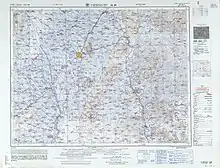Szechwan
English

Map of part of SZECHWAN PROVINCE 四川省 (AMS, 1958)
Etymology
From the Postal Romanization of Mandarin 四川 (Sìchuān).
Pronunciation
- enPR: sěʹchwänʹ, sǔʹchwänʹ
Proper noun
Szechwan
- Alternative form of Szechuan
- 1907, Mark Tennien, edited by Marshall Broomhall, The Chinese Empire: A General & Missionary Survey, London: Morgan & Scott, page 118:
- We shall then have two great streams of traffic at this point intersecting one another, the waterway of the Yangtse bringing produce and people down from Szechwan and the west to the coast, and taking back the imports and produce of the coast provinces, as well as numberless travellers to the far interior; while the great trunk railway from Canton to Peking will convey an enormous traffic between these cities and all intermediate places.
- 1934 May 12 [1934 May 11], “MISSIONARY SEIZED BY BANDITS IN CHINA; Rev. Howard Smith, American, Held for Ransom -- Hull Is Urged to Aid Release.”, in The New York Times, →ISSN, →OCLC, archived from the original on 27 August 2023, page 4:
- The Rev. Howard Smith of Washington, Pa., missionary of the Christian and Missionary Alliance at Pengshui, in Northwest Szechwan Province, has been kidnapped by "rouges," crimson-clad Chinese irregulars, it was learned here today.
- 1943, Hubert Freyn, Free China's New Deal, New York: Macmillan Company, →OCLC, page 6:
- Chungking became the wartime capital of Free China, and Szechwan, that vast, barely accessible province hidden behind steep mountain ranges, became the country’s wartime base.
- 1966, Chêng Tê-kʻun, Prehistoric China, volume 1, England: W. Heffer & Sons, page 37:
- Before leaving the Old Stone Age in Pleistocene China, it may be worthwhile to mention two additional sites in South China which have recently been investigated. In 1951 the remains of the Tzŭ-yang Man was unearthed at Huang-shan-hsi, in Tzŭ-yang, Szechwan (48. 49-50).
- 1971, The Cultural Revolution in the Provinces, Harvard University Press, page 8:
- Shielded from China proper and the central government by mountains, Szechwan is a huge "rice bowl" whose population of seventy to eighty million makes it larger than all but nine countries in the world. When the Communists took Szechwan in 1950, they were determined to bind the province tightly to the rest of the nation. National leaders, despite objections from Szechwan, concentrated on doubling Szechwan grain. In achieving an agricultural surplus, Szechwan 's leaders won a reputation for astutely applying mechanical innovation, work incentives, and technical training. In the Cultural Revolution such pragmatism was denounced for neglecting politics and pursuing "capitalist restoration."
- 1976 February 15, “Red security personnel involved in power struggle”, in Free China Weekly, volume XVII, number 6, Taipei, page 3:
- Radio Szechwan reported on Feb. 3 that many "security organizations" in Szechwan had sent cadres to schools at various levels to instruct students on the class struggle. . . to criticize and destroy the class enemy.
- 1998, Chris Peers, Warlords of China 700 BC to AD 1662, Arms and Armour, →ISBN, page 144:
- But the fighting was not yet over. The province of Szechwan in the far west did not fall for three more years, while Yunnan in the south-west remained in the hands of Yuan loyalists until 1382.
Derived terms
Descendants
- Latin: szechwanensis
Further reading
- “Szechwan”, in Collins English Dictionary.
- “Szechwan, pn.”, in Lexico, Dictionary.com; Oxford University Press, 2019–2022.
- “Szechwan”, in OneLook Dictionary Search.
- “Szechwan”, in Merriam-Webster Online Dictionary, Springfield, Mass.: Merriam-Webster, 1996–present.
- “Szechwan” in TheFreeDictionary.com, Huntingdon Valley, Pa.: Farlex, Inc., 2003–2024.
Portuguese
This article is issued from Wiktionary. The text is licensed under Creative Commons - Attribution - Sharealike. Additional terms may apply for the media files.